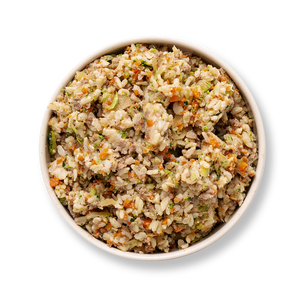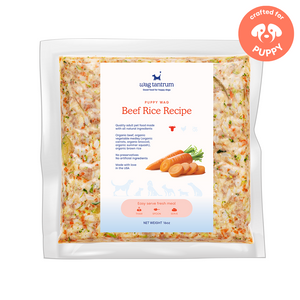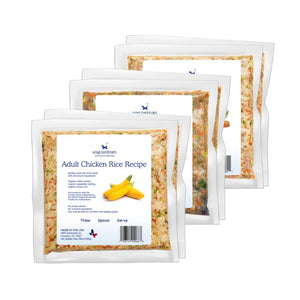Understanding Environmental Allergies in Dogs
Understanding Environmental Allergies in Dogs and How to Help with the Right Diet
As dog owners, we love to see our pets happy and healthy. But when allergies come into play, it can be frustrating, both for the dog and for us. One of the most common types of allergies affecting dogs today is environmental allergies. These can cause a range of symptoms like itchy skin, sneezing, ear infections, and even digestive upset. If you’re noticing your dog suffering from these issues, the right diet could be one way to help them feel better. In this post, we’ll discuss how dogs with environmental allergies can benefit from carefully chosen, gentle cooked dog food recipes and fresh dog food without chicken.
What Are Environmental Allergies in Dogs?
Just like humans, dogs can develop sensitivities to various substances in their environment. These allergies are often triggered by:
- Pollen
- Mold
- Dust mites
- Fleas
- Perfumes or cleaning products
When exposed to these allergens, dogs can experience a range of uncomfortable symptoms, from itching and scratching to respiratory issues. These allergies are typically seasonal but can also persist year-round, depending on the dog’s sensitivity and the environmental triggers.
How Diet Plays a Role in Managing Allergies
While you can’t always control the air your dog breathes, you can control what they eat. Diet plays a key role in reducing inflammation and boosting your dog’s overall immune response. Dogs with environmental allergies often benefit from foods that are easy to digest and packed with anti-inflammatory properties. One of the best ways to help is by feeding your dog fresh, high-quality food that is tailored to their specific needs.
Why Choose Gentle Cooked Dog Food Recipes?
Gentle cooked dog food recipes offer a wonderful option for dogs with sensitive digestive systems or allergies. These recipes involve cooking the ingredients at lower temperatures to preserve their natural nutrients while being easier on your dog's stomach. This can be especially helpful for dogs suffering from environmental allergies that also have food sensitivities.
For dogs with allergies, it’s important to choose recipes that avoid common allergens, especially if your dog is prone to reactions from certain ingredients. A gentle cooked food option allows you to control exactly what your dog is eating, ensuring that harmful allergens like beef or chicken (which can sometimes trigger reactions) are excluded.
Fresh Dog Food Without Chicken: A Good Alternative
Chicken is a common protein in many commercial dog foods, but it’s also a common allergen. For dogs with environmental allergies, it might be a good idea to avoid chicken as part of their diet. Fresh dog food without chickencan offer them an allergy-friendly alternative that still provides the nutrients they need.
Some excellent alternatives to chicken include:
- Turkey: A lean protein that’s easy to digest and less likely to cause allergic reactions.
- Lamb: Another easily digestible protein, often recommended for dogs with food sensitivities.
- Salmon: Rich in omega-3 fatty acids, which can help soothe inflammation and promote healthy skin.
- Duck: A novel protein source that’s less likely to trigger an allergic reaction, especially in dogs with common protein sensitivities.
Switching to fresh dog food without chicken ensures that you’re offering your dog the best possible chance to avoid flare-ups caused by food allergies.
Why Fresh Pet Food Can Be a Game Changer
Fresh pet food is another great option for dogs with environmental allergies. Unlike processed kibble, fresh food is often prepared with minimal preservatives, fillers, or artificial additives that can irritate sensitive dogs. By feeding your dog fresh food, you’re providing them with high-quality nutrients in their most natural form.
Fresh pet food is also incredibly customizable. Many fresh food companies offer meal plans tailored to specific health needs, including allergies, skin conditions, and sensitivities to certain ingredients. This means that your dog’s meals can be specifically designed to avoid common allergens while supporting their overall health.
Simple Tips for Feeding a Dog with Environmental Allergies
1. Consult Your Vet: If you suspect your dog has environmental allergies, a vet consultation is essential. They can help you determine if food allergies are a part of the issue and guide you on the best diet for your dog.
2. Look for Limited Ingredient Diets: Many dogs with environmental allergies do better with limited ingredient diets that focus on a few high-quality, easily digestible ingredients. Look for fresh pet food or gentle cooked dog food recipes with a single protein and a variety of healthy vegetables.
3. Avoid Common Allergens: As we mentioned earlier, chicken is a common allergen for many dogs. Other common allergens include beef, dairy, wheat, and soy. Be mindful of these ingredients when selecting fresh food for your dog.
4. Boost Omega-3s: Omega-3 fatty acids, found in fish oils like salmon or sardines, can help reduce inflammation and improve your dog’s skin health. If your dog has itchy skin from environmental allergies, adding omega-3-rich food can offer some relief.
5. Consider Probiotics: Probiotics support gut health, and a healthy gut can strengthen your dog’s immune system, making them less reactive to allergens. Many fresh dog foods include probiotics in their recipes to support digestion.
Wrapping It Up
Environmental allergies in dogs can be tough to manage, but the right diet can make a significant difference in how they feel. By choosing gentle cooked dog food recipes, fresh dog food without chicken, and fresh pet food options, you can support your dog’s immune system and help reduce the symptoms of environmental allergies. Always work closely with your vet to find the best diet for your dog’s specific needs, and remember that small changes can often lead to big improvements in your dog’s comfort and health.
By focusing on a fresh, balanced diet and avoiding common allergens, you can help your dog live a more comfortable, allergy-free life—one meal at a time.








